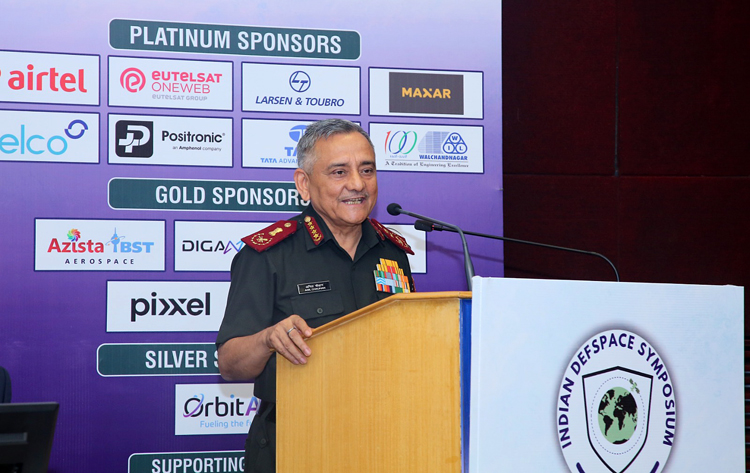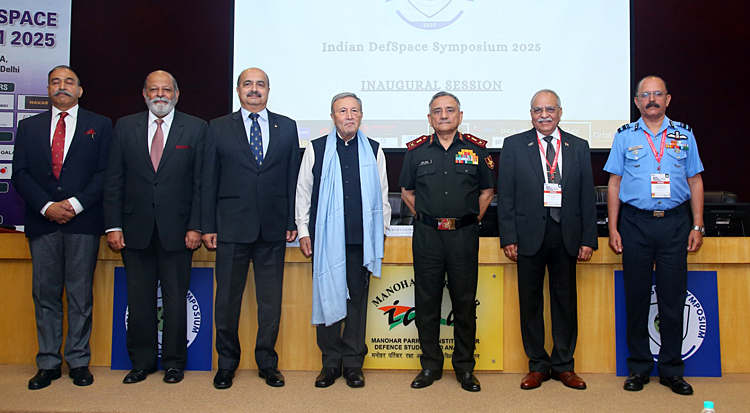INDIAN ARMED FORCES CHIEFS ON OUR RELENTLESS AND FOCUSED PUBLISHING EFFORTS

The insightful articles, inspiring narrations and analytical perspectives presented by the Editorial Team, establish an alluring connect with the reader. My compliments and best wishes to SP Guide Publications.

"Over the past 60 years, the growth of SP Guide Publications has mirrored the rising stature of Indian Navy. Its well-researched and informative magazines on Defence and Aerospace sector have served to shape an educated opinion of our military personnel, policy makers and the public alike. I wish SP's Publication team continued success, fair winds and following seas in all future endeavour!"

Since, its inception in 1964, SP Guide Publications has consistently demonstrated commitment to high-quality journalism in the aerospace and defence sectors, earning a well-deserved reputation as Asia's largest media house in this domain. I wish SP Guide Publications continued success in its pursuit of excellence.
- Operation Sindoor: Resolute yet Restrained
- India’s Operation Sindoor Sends a Clear Message to Terror and the World – ‘ZERO TOLERANCE’
- Japan and India set forth a defence cooperation consultancy framework, talks on tank and jet engines
- Terrorist Attack in Pahalgam in Kashmir: Unfolding a long surgical war against PAK
- Lt General Pratik Sharma takes over Command of Indian Army's Northern Command
The Space Frontier
Chief of Defence Staff (CDS) General Anil Chauhan, has announced in a recent address that India is poised to formally establish its military presence in space with the release of a 'Military Space Doctrine' and 'National Space Policy' within the next two-three months
 |
The Author is Former Director General of Information Systems and A Special Forces Veteran, Indian Army |

In 2021, the 'Space Doctrine' released by the Takshashila Institution had stated that India will pursue a doctrine anchored in deterrence and requiring both defensive and offensive capabilities, with the primary objective of preserving India's use of space. India has been making significant advances in space, both by the Indian Space Research Organisation (ISRO), IN-SPACe, as well as the private sector. According to news reports of April 6, 2025, the Nagpur-based startup 'Spaceverse Technologies' is developing India's first privately built reusable satellite launch vehicle, representing a significant milestone in India's capabilities in developing advanced space launch systems. This reusable satellite launch vehicle can take-off vertically and return to Earth horizontally (like an aircraft), allowing the vehicle to be used for up to five space missions. The launch vehicle can reach altitudes between 300 to 500 km, making it suitable for various satellite deployment missions in Low Earth Orbit (LEO). In February 2024, the Indian Space economy, which was estimated to be around $8.4 billion, is expected to grow to $44 billion by 2033.
Now the Chief of Defence Staff (CDS) General Anil Chauhan, has announced in a recent address that India is poised to formally establish its military presence in space with the release of a 'Military Space Doctrine' and 'National Space Policy' within the next two-three months, according to media reports of April 7, 2025. This development comes amid increasing focus on defence-space collaboration across multiple fronts, building upon India's existing space security framework, which began taking formal shape with earlier doctrines that emphasised deterrence capabilities.
CDS General Chauhan placed particular emphasis on the crucial role private companies will play in India's space future
The CDS said that the broader Indian Space Policy 2023 had already set out guiding principles to "augment space capabilities; enable, encourage and develop a flourishing commercial presence in space," while creating a "level playing field and favourable regulatory environment for players within the Indian private sector". The coming military doctrine will further define strategic responsibilities between civilian and military space applications.

General Chauhan placed particular emphasis on the crucial role private companies will play in India's space future, saying, "We need to strengthen satellite services, boost manufacturing and launch operations, stimulate the domestic market, and build state-of-the-art infrastructure to position India as a global leader in the space sector." He highlighted the dramatic growth in India's space startup ecosystem; from probably one startup in 2014 to 204 startups in the space sector with 54 additions in 2023 itself. In 2023, India invested $123 million in the space sector, bringing the total funding to $380.25 million. With private innovation recognised as a key driver for advancing space capabilities, this trajectory would continue under the new doctrine.
Referring to military space operations, the CDS emphasised that the military focus should remain on practical, near-Earth applications
Referring to military space operations, the CDS emphasised that the military focus should remain on practical, near-Earth applications, saying, "In space, our focus should be on those orbital regions that directly affect terrestrial warfare and national security, not distant galaxies," while identifying the Earth's orbital zones; Low Earth Orbit (LEO), Medium Earth Orbit (MEO), and Geostationary Orbit (GEO) as the primary domains of interest for military operations. He advised military professionals to leave the realm of interplanetary/intergalactic travel to others and focus on clearly defining and operating within the scope of military space.
The CDS described the forthcoming Space Activities Bill 2025 a pivotal reform in the space sector, which will provide the regulatory framework necessary to support India's expanded vision. Interestingly, the Indian Military is to participate in the US Space Command's annual Global Sentinel exercise in 2025, after having attended as observers in February 2024. This will provide valuable experience in space operations, also helping in developing our own military space doctrine.
Nagpur-based startup 'Spaceverse Technologies' is developing India's first privately built reusable satellite launch vehicle, representing a significant milestone in India's capabilities in developing advanced space launch systems
Militarisation of space, and extensive use of space in new age warfare is becoming a reality. The US intelligence community's 2025 Annual Threat Assessment report, published by the Office of the Director of National Intelligence (DNI) in March 2025, states that Russia launched a satellite in February 2022 (purportedly to test systems exposed to radiation and high-energy particles) for nuclear weaponisation in space. A nuclear explosion in space wouldn't create a fireball or shockwave due to the vacuum, but it would unleash a massive electromagnetic pulse (EMP) and high-energy radiation capable of crippling electronic systems across vast distances; wreaking havoc on global infrastructure, disable commercial and military satellites, and threaten international security.

The US and others relying on satellite technology for communications, navigation, weather forecasting, and defence would face severe disruptions. The report is the first official acknowledgment by US intelligence of a possible Russian space-based nuclear weapons programme. While not directly confirming Russia's involvement, Derek M. Tournear, head of the Space Development Agency, emphasised that such a detonation would destroy commercial, civilian, and military satellites, calling it "an attack on the world."
The US intelligence community's 2025 Annual Threat Assessment report states that Russia launched a satellite purportedly to test systems exposed to radiation and high-energy particles, for nuclear weaponisation in space
Earlier, John F. Plumb, former Assistant Secretary of Defence for Space policy, warned in a congressional hearing that a nuclear weapon in space could jeopardise all government and commercial satellites, as well as critical services related to communication, meteorology, agriculture, and national security, also pointing out that satellites in LEO are particularly vulnerable, as they lack protection against nuclear explosions. He also said that a sufficiently powerful explosion in the right position could prevent the launch of new satellites into low orbit for up to a year.
It may be said that the US is making such an official statement because of Donald Trump's second presidential term; his global tariffs war, prolonging the ceasefire effort in Ukraine, the China-Russia-Iran alignment, specific targeting of China with the possibility of a direct conflict, and the like. But this much is certain, that if the US suspected Russia of nuclearising space way back in 2022, both China and the US would be making the same efforts, no matter how innocuous. This is also perhaps one reason why Trump has sanctioned the unprecedented $1 Trillion defence budget. India should be ready for extensive use of space by China in the next war.





